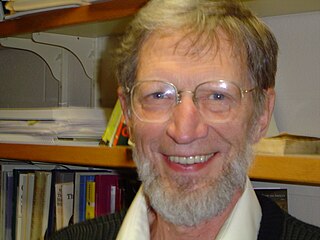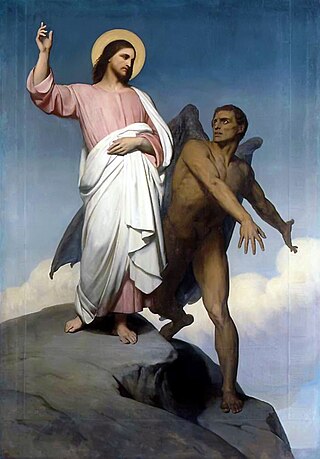
On the Consolation of Philosophy, often titled as The Consolation of Philosophy or simply the Consolation, is a philosophical work by the Roman philosopher Boethius. Written in 523 while he was imprisoned and awaiting execution by the Ostrogothic King Theodoric, it is often described as the last great Western work of the Classical Period. Boethius' Consolation heavily influenced the philosophy of late antiquity, as well as Medieval and early Renaissance Christianity.
In the Platonic, Neopythagorean, Middle Platonic, and Neoplatonic schools of philosophy, the demiurge is an artisan-like figure responsible for fashioning and maintaining the physical universe. The Gnostics adopted the term demiurge. Although a fashioner, the demiurge is not necessarily the same as the creator figure in the monotheistic sense, because the demiurge itself and the material from which the demiurge fashions the universe are both considered consequences of something else. Depending on the system, they may be considered either uncreated and eternal or the product of some other entity.

Evil, or being bad, in a general sense, is acting out morally incorrect behavior, or the condition of causing unnecessary pain and suffering, thus, containing a net negative on the world.

Karma is a concept of action, work, or deed, and its effect or consequences. In Indian religions, the term more specifically refers to a principle of cause and effect, often descriptively called the principle of karma, wherein individuals' intent and actions (cause) influence their future (effect): Good intent and good deeds contribute to good karma and happier rebirths, while bad intent and bad deeds contribute to bad karma and bad rebirths. In some scriptures, however, there is no link between rebirth and karma. Karma is often misunderstood as fate, destiny, or predetermination.
In philosophical ethics, the naturalistic fallacy is the claim that it is possible to define good in terms of natural entities, or properties such as pleasant or desirable. The term was introduced by British philosopher G. E. Moore in his 1903 book Principia Ethica.
The problem of evil is the question of how to reconcile the existence of evil and suffering with an omnipotent, omnibenevolent, and omniscient God. There are currently differing definitions of these concepts. The best known presentation of the problem is attributed to the Greek philosopher Epicurus. It was popularized by David Hume.

In the philosophy of religion, a theodicy is an argument that attempts to resolve the problem of evil that arises when omnipotence, omnibenevolence, and omniscience are all simultaneously ascribed to God. Unlike a defence, which merely tries to demonstrate that the coexistence of God and evil is logically possible, a theodicy additionally provides a framework wherein God's existence is considered plausible. The German philosopher and mathematician Gottfried Leibniz coined the term "theodicy" in 1710 in his work Théodicée, though numerous attempts to resolve the problem of evil had previously been proposed. The British philosopher John Hick traced the history of moral theodicy in his 1966 work Evil and the God of Love, identifying three major traditions:
- the Plotinian theodicy, named after Plotinus
- the Augustinian theodicy, which Hick based on the writings of Augustine of Hippo
- the Irenaean theodicy, which Hick developed, based on the thinking of St. Irenaeus

Alvin Carl Plantinga is an American analytic philosopher who works primarily in the fields of philosophy of religion, epistemology, and logic.

Omnibenevolence is defined by the Oxford English Dictionary as "unlimited or infinite benevolence". Some philosophers have argued that it is impossible, or at least improbable, for a deity to exhibit such a property alongside omniscience and omnipotence, as a result of the problem of evil. However, some philosophers, such as Alvin Plantinga, argue the plausibility of co-existence.
In most contexts, the concept of good denotes the conduct that should be preferred when posed with a choice between possible actions. Good is generally considered to be the opposite of evil and is of ethics, morality, philosophy, and religion. The specific meaning and etymology of the term and its associated translations among ancient and contemporary languages show substantial variation in its inflection and meaning, depending on circumstances of place and history, or of philosophical or religious context.

Beyond Good and Evil: Prelude to a Philosophy of the Future is a book by philosopher Friedrich Nietzsche that covers ideas in his previous work Thus Spoke Zarathustra but with a more polemical approach. It was first published in 1886 under the publishing house C. G. Naumann of Leipzig at the author's own expense and first translated into English by Helen Zimmern, who was two years younger than Nietzsche and knew the author.

Max Ferdinand Scheler was a German philosopher known for his work in phenomenology, ethics, and philosophical anthropology. Considered in his lifetime one of the most prominent German philosophers, Scheler developed the philosophical method of Edmund Husserl, the founder of phenomenology. Given that school's utopian ambitions of re-founding all of human knowledge, Scheler was nicknamed the "Adam of the philosophical paradise" by José Ortega y Gasset.

Thomism is the philosophical and theological school which arose as a legacy of the work and thought of Thomas Aquinas (1225–1274), the Dominican philosopher, theologian, and Doctor of the Church.
Middle Platonism is the modern name given to a stage in the development of Platonic philosophy, lasting from about 90 BC – when Antiochus of Ascalon rejected the scepticism of the new Academy – until the development of neoplatonism under Plotinus in the 3rd century. Middle Platonism absorbed many doctrines from the rival Peripatetic and Stoic schools. The pre-eminent philosopher in this period, Plutarch, defended the freedom of the will and the immortality of the soul. He sought to show that God, in creating the world, had transformed matter, as the receptacle of evil, into the divine soul of the world, where it continued to operate as the source of all evil. God is a transcendent being, who operates through divine intermediaries, which are the gods and daemons of popular religion. Numenius of Apamea combined Platonism with neopythagoreanism and other eastern philosophies, in a move which would prefigure the development of neoplatonism.

The Irenaean theodicy is a Christian theodicy. It defends the probability of an omnipotent and omnibenevolent God in the face of evidence of evil in the world. Numerous variations of theodicy have been proposed which all maintain that, while evil exists, God is either not responsible for creating evil, or he is not guilty for creating evil. Typically, the Irenaean theodicy asserts that the world is the best of all possible worlds because it allows humans to fully develop. Most versions of the Irenaean theodicy propose that creation is incomplete, as humans are not yet fully developed, and experiencing evil and suffering is necessary for such development.

Stoicism is a school of Hellenistic philosophy that flourished in Ancient Greece and Ancient Rome. The Stoics believed that the practice of virtue is enough to achieve eudaimonia: a well-lived life. The Stoics identified the path to achieving it with a life spent practicing the four virtues in everyday life: wisdom, courage, temperance or moderation, and justice, and living in accordance with nature. It was founded in the ancient Agora of Athens by Zeno of Citium around 300 BC.
Neoplatonism is a version of Platonic philosophy that emerged in the 3rd century AD against the background of Hellenistic philosophy and religion. The term does not encapsulate a set of ideas as much as a series of thinkers. Among the common ideas it maintains is monism, the doctrine that all of reality can be derived from a single principle, "the One".
Radical evil is a phrase used by German philosopher Immanuel Kant, one representing the Christian term, radix malorum. Kant believed that human beings naturally have a tendency to be evil. He explains radical evil as corruption that entirely takes over a human being and leads to desires acting against the universal moral law. The outcome of one's natural tendency, or innate propensity, towards evil are actions or "deeds" that subordinate the moral law. According to Kant, these actions oppose universally moral maxims and display self-love and self conceit. By many authors, Kant's concept of radical evil is seen as a paradox and inconsistent through his development of moral theories.
Skeptical theism is the view that people should remain skeptical of their ability to discern whether their perceptions about evil can be considered good evidence against the existence of the orthodox Christian God. The central thesis of skeptical theism is that it would not be surprising for an infinitely intelligent and knowledgeable being's reasons for permitting evils to be beyond human comprehension. That is, what may seem like pointless evils may be necessary for a greater good or to prevent equal or even greater evils. This central thesis may be argued from a theistic perspective, but is also argued to defend positions of agnosticism.

In religion, ethics, philosophy, and psychology, "good and evil" is a very common dichotomy. In cultures with Manichaean and Abrahamic religious influence, evil is perceived as the dualistic antagonistic opposite of good, in which good should prevail and evil should be defeated. In cultures with Buddhist spiritual influence, both good and evil are perceived as part of an antagonistic duality that itself must be overcome through achieving Śūnyatā: emptiness in the sense of recognition of good and evil being two opposing principles but not a reality, emptying the duality of them, and achieving a oneness.











